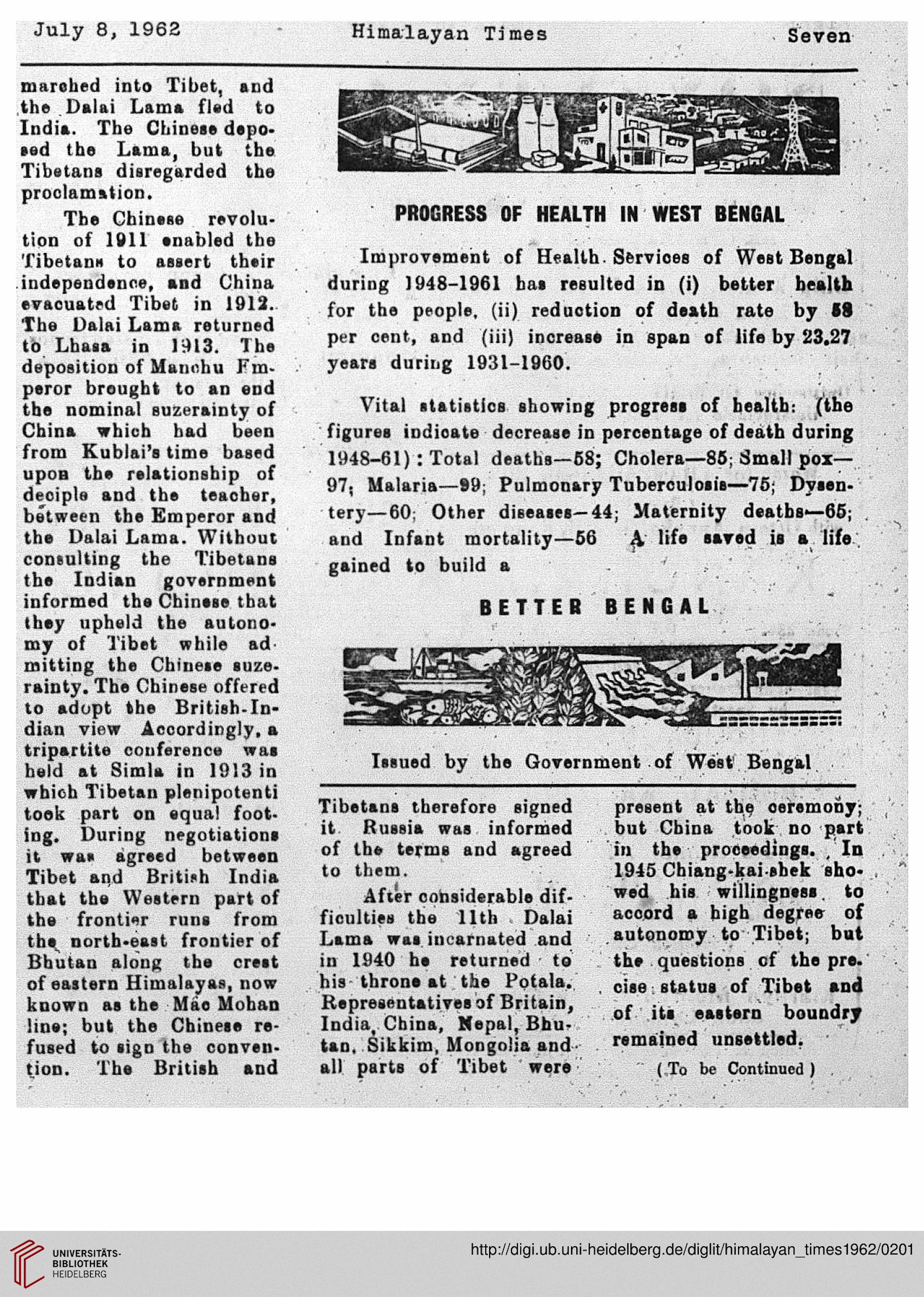July 8, 1962
Himalayan Times
Seven
PROGRESS OF HEALTH IN WEST BENGAL
Improvement of Health Services of West Bengal
during 1948-1961 has resulted in (i) better health
for the people, (ii) reduction of death rate by (9
per cent, and (iii) increase in span of life by 23.27
years during 1931-1960.
Vital statistics showing progress of health: (the
figures indioate decrease in percentage of death during
1948-61) : Total deaths—68; Cholera—85; Small pox—
97; Malaria—99; Pulmonary Tuberculosis—76; Dysen-
tery—60; Other diseases—44; Maternity deaths—66;
and Infant mortality—66 A. life saved is a life
gained to build a
BETTER BENGAL
Issued by the Government of West Bengal
marched into Tibet, and
the Dalai Lama fled to
India. The Chinese depo-
sed the Lama, but the
Tibetans disregarded the
proclamation.
The Chinese revolu-
tion of 1U11 enabled the
Tibetans to assert their
independence, and China
evacuated Tibet in 1912.
The Dalai Lama returned
to Lhasa in 1913. The
deposition of Mannbu I'm-
peror brought to an end
the nominal suzerainty of
China whioh had been
from Kublai's time based
upon the relationship of
deoiple and the teacher,
between the Emperor and
the Dalai Lama. Without
consulting the Tibetans
the Indian government
informed the Chinese that
they upheld the autono-
my of Tibet while ad-
mitting the Chinese suze-
rainty. The Chinese offered
to adopt the British-In-
dian view Accordingly, a
tripartite conference was
held at Simla in 1913 in
which Tibetan plenipotenti
took part on equal foot-
ing. During negotiations
it was agreed between
Tibet and British India
that the Western part of
the frontier runs from
t ho north-east frontier of
Bhutan along the crest
of eastern Himalayas, now
known as the Mae Mohan
line; but the Chinese re-
fused to sign the conven-
tion. The British and
Tibetans therefore signed
it Russia was informed
of the terms and agreed
to them.
After considerable dif-
ficulties the 11th Dalai
Lama was incarnated and
in 1940 he returned to
his throne at the Potala.
Representatives of Britain,
India, China, Mepal, Bhu-
tan, Sikkim, Mongolia and
all parts of Tibet were
present at the ceremony;
but China took no part
in the proceedings. , In
1945 Chiang-kaiehek sho-
wed his willingness, to
accord a high degree of
autonomy to Tibet; bat
the . questions of the pre.
cise: status of Tibet and
of its eastern boundry
remained unsettled.
( To be Continued ) .
Himalayan Times
Seven
PROGRESS OF HEALTH IN WEST BENGAL
Improvement of Health Services of West Bengal
during 1948-1961 has resulted in (i) better health
for the people, (ii) reduction of death rate by (9
per cent, and (iii) increase in span of life by 23.27
years during 1931-1960.
Vital statistics showing progress of health: (the
figures indioate decrease in percentage of death during
1948-61) : Total deaths—68; Cholera—85; Small pox—
97; Malaria—99; Pulmonary Tuberculosis—76; Dysen-
tery—60; Other diseases—44; Maternity deaths—66;
and Infant mortality—66 A. life saved is a life
gained to build a
BETTER BENGAL
Issued by the Government of West Bengal
marched into Tibet, and
the Dalai Lama fled to
India. The Chinese depo-
sed the Lama, but the
Tibetans disregarded the
proclamation.
The Chinese revolu-
tion of 1U11 enabled the
Tibetans to assert their
independence, and China
evacuated Tibet in 1912.
The Dalai Lama returned
to Lhasa in 1913. The
deposition of Mannbu I'm-
peror brought to an end
the nominal suzerainty of
China whioh had been
from Kublai's time based
upon the relationship of
deoiple and the teacher,
between the Emperor and
the Dalai Lama. Without
consulting the Tibetans
the Indian government
informed the Chinese that
they upheld the autono-
my of Tibet while ad-
mitting the Chinese suze-
rainty. The Chinese offered
to adopt the British-In-
dian view Accordingly, a
tripartite conference was
held at Simla in 1913 in
which Tibetan plenipotenti
took part on equal foot-
ing. During negotiations
it was agreed between
Tibet and British India
that the Western part of
the frontier runs from
t ho north-east frontier of
Bhutan along the crest
of eastern Himalayas, now
known as the Mae Mohan
line; but the Chinese re-
fused to sign the conven-
tion. The British and
Tibetans therefore signed
it Russia was informed
of the terms and agreed
to them.
After considerable dif-
ficulties the 11th Dalai
Lama was incarnated and
in 1940 he returned to
his throne at the Potala.
Representatives of Britain,
India, China, Mepal, Bhu-
tan, Sikkim, Mongolia and
all parts of Tibet were
present at the ceremony;
but China took no part
in the proceedings. , In
1945 Chiang-kaiehek sho-
wed his willingness, to
accord a high degree of
autonomy to Tibet; bat
the . questions of the pre.
cise: status of Tibet and
of its eastern boundry
remained unsettled.
( To be Continued ) .




